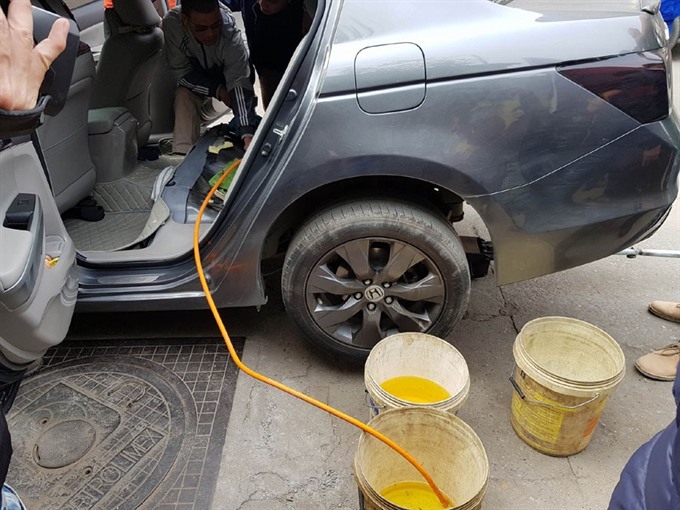 Society
Society

Petrol smuggling and trade fraud continues to be a big problem in Viet Nam, with several cases of fake and poor quality gasoline discovered by Government agencies.
 |
| Addition of illegal compounds to fuels can cause damaging and unpleasant issues to environment and less durability to the vehicles’ engine, experts say.- Photo laodong.vn |
HÀ NỘI – Petrol smuggling and trade fraud continues to be a big problem in Việt Nam, with several cases of fake and poor quality gasoline discovered by Government agencies.
According to National Steering Committee 389, the central authority on fighting smuggling, commercial fraud and counterfeit goods, inspectors have found gasoline samples taken from petrol companies and stations are diluted and low quality A92 gasoline.
The substandard fuel was found in Hà Nội, HCM City, Hòa Bình, Bắc Giang, Bắc Ninh, Nghệ An, Lâm Đồng and Cần Thơ provinces.
Some samples showed A92 petrol content was below 70 per cent, Lao Động (Labour) newspaper reported.
The source of the solvents was mostly found in Cần Thơ and HCM City.
The latest case was detected on January 9 in Cần Thơ City. Police caught a staff member of Vạn Nguyên 2 Petrol Company pumping 6,000 litres of detergent solvent from a tanker into another, which contained 3,000 litres of the solvent mixed with 3,000 litres of petrol.
The solvent was identified as Solmix industrial detergent.
Earlier last October, inspectors from Nghệ An Department of Sciences and Technology detected 12 gas stations violating regulations on gasoline quality. A further investigation between the inspectors and police revealed that two companies – Thanh Ngũ Ltd Company in Diễn Châu District and Kiên Lục Company in Quỳnh Lưu District – made fake A92 gasoline.
The company owners admitted to the police that they bought hundreds of thousands of litres of solvents to be mixed with A92 gasoline, and then sold more than 2 million litres of fake gasoline in Nghệ An Province.
Kiên Lục Company confessed it had bought solvents from Cần Thơ and then resold it to some gas stations, while mixing the remainder with RON 92 gasoline to be sold to customers.
Gasoline samples taken from these stations were diluted, low quality petrol with octane numbers lower than regulated.
An octane rating or octane number is a standard measure of the performance of a fuel. The higher the number, the more compression the fuel can withstand before igniting. Using lower octane gasoline may lead to engine problems.
Deputy Director of Market Management Department under the Ministry of Industry and Trade, Trần Hùng, told the newspaper that National Steering Committee 389 and market management forces could not handle the problem alone.
Quality management of petroleum was the responsibility of the General Department of Quality Measurement and the Ministry of Science and Technology, he said.
According to experts, adding illegal compounds to fuels can cause environmental risks due to the emission of vapours and toxic gases, damage engines and create unfair competition in fuel prices, causing losses to the State in tax revenue.
It is difficult to stop firms diluting petrol. If the solvent quantity is not controlled, it will greatly affect the quality of petrol.
The most commonly used solvents include ethanol, acetone and methanol.
Many petrol companies and stations have used excessive amounts of solvents to make profits.
Fuel fraud lines the pockets of criminals and can have a devastating effect on legitimate fuel traders, according to the experts.
To prevent and control petroleum fraud, the Standing Office of National Steering Committee 389 assigned the Ministry of Finance to instruct the General Department of Taxation to help localities accurately assess the quality of petrol in petrol stations.
Tax revenue collected from petroleum products business in localities has sharply increased compared to the past, said Đàm Thanh Thế, director of the Standing Office.
In addition, competent forces have strengthened the inspection of individuals and organisations trading low quality petroleum. - VNS




